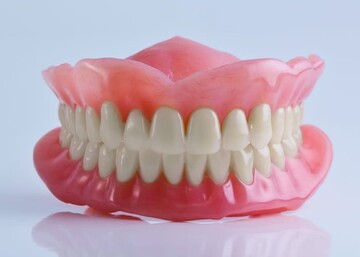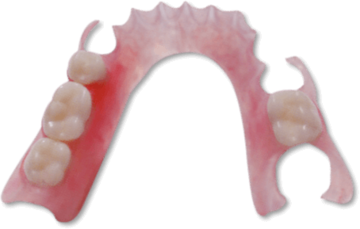dentures
It is sometimes difficult to get used to your newly placed dentures. They can feel bulky, loose and awkward. In order to make your adjustment period smoother, here are a few guidelines to follow:
- Wear your dentures all the time after you first receive them.
- Never use adhesives on your dentures unless instructed to by your doctor.
- When you go to sleep, remember to always remove your dentures.
- Always brush your dentures after removal and store them in a bowl of water. You can soak your dentures in a denture cleaner as well, but only after you have brushed them.
- If you experience any sore spots, looseness or discomfort please let your doctor know so they can help.
Never try to adjust your dentures on your own, each individual will have a different adjustment period and it will take time for you to become comfortable with your new teeth.
Partial Dentures are used to replace missing teeth. Partials have metal hooks that grab onto the neighboring teeth for support. Unfortunately, the hooks have a tendency to loosen up the teeth and partial dentures have the tendency to get loose and require multiple adjustments throughout the years. On the upper, there is a large piece of metal that goes across the roof of the mouth which can interfere with taste sensation and/or have food collected under it. Additionally, the partial plate can press into the gum tissue and cause sores. The partial dental plate must be taken in and out each day for cleaning. It is certainly not an ideal alternative.
A precision partial is held in place by a specifically shaped extension that locks into an area on a natural tooth that has been crowned. This ensures that the denture will not slip or come out when speaking or chewing.
Temporary or interim appliances serve many useful purposes and are often an integral part of a prosthetic treatment plan. These appliances can be designed to be either fixed or removable. This simple appliance is excellent for temporary replacement of front teeth while the patient is waiting for a permanent bridge, a partial, or implants. This removable interim bridge is made of a clear vacuum-formed material. The appliance simply snaps into place.
An Immediate Denture is designed to be placed in the mouth immediately after the extraction of your natural teeth. An Immediate Denture eliminates the embarrassment of having to go without teeth, while the gums are healing.
An Immediate denture is designed to fit your mouth at the time impressions are taken; however, after a few months your gums will change drastically due to "gum resorption." It's possible that the denture will rub against the gums when it is first placed, which may be very sore until it can be adjusted. Gums shrink the most within the first year of having teeth extracted. Most patients will require relines within a few months, to restore the fit of their dentures. Expect that the first year of wearing dentures will also be the most difficult and costly.
Since an Immediate Denture covers over the surgical site and the tooth sockets, it helps keep that tender surgical area from becoming irritated, much as a bandage would. Do not remove your denture by yourself, even for just a few minutes, until your dentist tells you it's all right. The gum tissue underneath the denture has a tendency to swell. If you take the denture out for very long, you may never get it back in again.
At times, it is necessary for all teeth to be removed due to extensive periodontal disease and/or due to decay. An alternative for the replacement of all the teeth is a complete upper and/or lower denture. These dentures require support from your gum pad and many times require the use of dental adhesive. Throughout life, the dentures require constant adjustment and refitting and can cause the jaw bone to melt away making the dentures loose and once again requiring continuous adjustment.



 Request an Appointment
Request an Appointment
